The following article is important, but it barely touches my concern with our collective illusion of peacetime, where we seek to deter and prepare for war, but fail to develop a strategy for the war we're in. The condition of peace is a relationship between two or more entities, throughout all of history I doubt if peace has ever been a condition that has existed worldwide between all entities. As for the U.S., it has not been at peace in the purest sense in decades (if ever). We have persistently used our military or intelligence services' paramilitaries' (and other means) to impose our will on other entities (state or non-state actor groups), and states and non-state actors have been at war with us.
The character of these wars vary considerably, but it can still be viewed as war. Chinese military theorists in "Unrestricted Warfare" wrote,
Articles on Russia's non-linear warfare argue that battles are only part of a larger strategy, they are rarely intended to be decisive in themselves. Not surprising, the U.S. being excessively influenced by Clausewitz's view of war and the center of gravity in "On War" seek victory by capturing an adversary's capital (Baghdad) or attriting the adversary's military so they can no longer resist. In short, we attempt to make battle decisive in all cases, because it fits our view of war. How war is supposed to be. When al-Qaeda and other groups present a situation where our traditional way of war fails to produce desired results we're perplexed. We fell back on colonial era COIN as a potential solution, with some even arguing it isn't war. Those arguing it isn't war can't define war, so it makes calling it something other than war a convenient argument, but one that isn't well supported.This kind of war means that all means will be in readiness, information will be omnipresent, and the battlefield will be everywhere [global]. It means that all weapons and technology can be superimposed at will, it means that all the boundaries lying between the two worlds of war and non-war, of military and non-military [involves more than military means], will be totally destroyed,
I think we should simply embrace the reality that we're in a persistent state of confrontation, conflict, or war with a few adversaries and develop a strategy to appropriately wage it. That isn't a call to arms in the traditional sense, but a call to synergize all of the elements of national power with a greater degree of seriousness focused on defeating our adversaries. These wars in most cases will be waged differently than our preferred way of war where battle is decisive. Instead, they will be waged largely by shaping, political warfare, legal warfare, netwar, and an occasional requirement for a relative major combat operation.
Our adversaries have developed complex, global strategies to pursue their ends as we see in the South China Sea, Ukraine, and with various non-state actors such as ISIS, al-Qaeda, and Lebanese Hezbollah. To be frank their strategies and their ability to carry them out are quite limited, yet they often seem like they're 10 feet tall because we fail to develop comprehensive strategies to counter them. I suggest one reason we fail to adapt is because we fool ourselves with the illusion we're at peace and not at war.
There’s No Such Thing as Peacetime
http://foreignpolicy.com/2015/03/13/...vil-liberties/
Much more in the article.As Dudziak puts it in War Time, “Military conflict has been ongoing for decades, yet public policy rests on the false assumption that it is an aberration. This enables a culture of irresponsibility, as ‘wartime’ serves as an argument and an excuse for national security-related ruptures of the usual legal order. If we abandon the idea that war is confined in time we can see more clearly that our law and politics are not suspended by an exception to the regular order of things.… Wartime has become the only kind of time we have, and therefore is a time within which American politics must function.” She adds, “A cultural framing of wartimes as discrete and temporary occasions, destined to give way to a state of normality, undermines democratic vigilance.”









Bookmarks